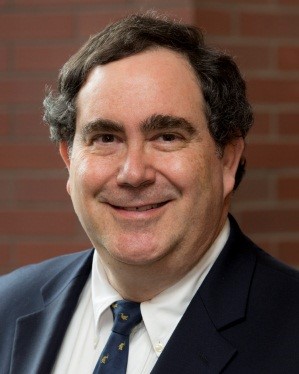Work and Life is a radio program hosted by Stew Friedman, director of the Wharton Work/Life Integration Project, on Sirius XM’s Channel 111, Business Radio Powered by Wharton. Every Tuesday at 7 pm EST, Stew speaks with everyday people and the world’s leading experts about creating harmony among work, home, community, and the private self (mind, body, and spirit).
Jerry Jacobs is Professor of Sociology at the University of Pennsylvania and Founding President of the Work and Family Researchers Network, an interdisciplinary and international scholarly association that focuses on work and family issues. His research with Kathleen Gerson was honored with the Rosabeth Moss Kanter Award for Excellence in Work-Family Research in 2002, and led to the publication of The Time Divide: Work, Family and Gender Inequality, published by Harvard University Press in 2004.
Kathleen Gerson is Collegiate Professor of Sociology at NYU, where she studies gender, work, and family change. Her most recent book, The Unfinished Revolution: Coming of Age in a New Era of Gender, Work, and Family, is an award-winning study of how new generations have responded to the gender revolution of the last several decades. She is now conducting a study about the challenges facing today’s adults, who must build their work and family lives amid the increasingly insecure economic climate of the new economy.
The following are edited excerpts of their conversation. Full podcast.
Kathleen Gerson: Our findings seem to provide one more piece of the puzzle of how dramatic change has been. Jerry [Jacobs] and I continue to be baffled that so many people are skeptical that these changes have occurred. I think in some ways our private lives have moved forward in a way that public discussions about them simply haven’t caught up.
Stewart Friedman: Can you elaborate on what you mean by that?
KG: There’s a bad news orientation in the media and, to some extent, in our political discourse, in which people tend to be quite skeptical about social change. If I were to sum that up, I would say two opposite arguments are being made. First, nothing is really changed, we’re going back to the old ways, women are still facing these huge barriers and men continue to be resistant to these changes. The other side of the story, which ironically or paradoxically presents the opposite picture, is women have changed so quickly that men are being left behind and this is not good for society and men and women are unhappy about this reversal. What Jerry and I have found is that neither of those stories is true. In fact, what’s happening is men and women are converging in terms of not only how they want to live their lives and what they want to get done in their lives, but also in terms of their views about what other people’s choices should be, and how we as a society should allow people to make those choices. Even though the political discourse is very contentious, what Jerry and I have found is that ordinary Americans, across a very broad spectrum of demographic and social categories, support the idea that gender, in fact, should not be the primary driver of who does what, at work or in the home. These decisions should be driven by what people want, what people prefer, and what’s best for their families, and how they can do the best in a very increasingly uncertain and difficult situation. What we really need is to relieve the difficulties that families are facing to allow them to develop the strategy they prefer.
SF: To produce greater human freedom, after all, right?
KG: I would underline the world human. It would be nice if we could move beyond these categories of women and men, and talk about human beings, parents, workers.
SF: Creating options and choices for people, then produces the kinds of roles they want to create with the support that they need. But there’s so much here to unpack.
Jerry Jacobs:  But before you unpack, let me explain a little more specifically what we did. There’s a body of research that talks about gender role ideology, and it shows that a lot of people are much more flexible in terms of their views on what women’s and men’s role should be. It also shows there’s a substantial minority stuck in the old ways, committed to traditional, standard gender ideology.
But before you unpack, let me explain a little more specifically what we did. There’s a body of research that talks about gender role ideology, and it shows that a lot of people are much more flexible in terms of their views on what women’s and men’s role should be. It also shows there’s a substantial minority stuck in the old ways, committed to traditional, standard gender ideology.
SF: That is, of course, the model of the single-earner dad with a mom at home taking care of kids; caregiving and breadwinning split by men and women doing one or the other roles.
JJ: Our concern about this research is it doesn’t really say very much about situations and specifics. One of the motivating factors behind what we did is we asked ourselves, if we give the average person, respondents chosen at random, a national random sample, if we give them specific stories, specific situations regarding men’s and women’s choices, what will turn out to be more important: the situations or commitment to gender ideology? The question is are people stuck in a set of blinders that basically say women belong in the home no matter what, or does it depend? Does it depend on if she likes her job? The other thing we specifically looked at was whether her family depended on her income. We have remarkably powerful evidence to suggest that situations are more important than anything else, than whether you’re a man or a woman, whether you’re single or married, it’s not that the patterns are identical for fathers and mothers, but the situations were more important than gender.
SF: Why is that so important, as an observation about our society? I think most of our listeners are less interested in sociological literature, but of course those two are related, what’s the so what there in terms of what people in business as well as public policy makers ought to be thinking about as a result of what you observed?
KG: it’s important because what it tells us is is that ordinary Americans, women and men across ages, races, and situations, are far more sympathetic to the particular situations that individuals families are facing and are far more flexible in their views about what women and men should do than either our political discourse or our public policy or our workplace policies, even for private workplaces, recognize. If both our government policies and employers would pay more attention to this, then I think that would not just improve the way we talk about these issues but could make a real difference in the lives of men and women, mothers and fathers, and children.
JJ: If we could make childcare more affordable and higher quality, our data suggests that more people would support women working, or more people would support mothers of young children being in a labor force.
SF: How does that equation work? Why is the advent of a greater daycare support going to lead to greater support of women in the workplace?
JJ: One of our key findings was that when mothers are satisfied with the childcare that they’re getting, people are more supportive of her working. They’re much more skeptical of mothers’ employment if there’s a feeling that the childcare that they have access to is inadequate or unsatisfactory.
KG: Another finding is that if women can earn enough to support their families, there’s enough support for fathers staying home with their children, especially if those fathers are dissatisfied and unhappy with their jobs and their families don’t feel they have adequate childcare. In a sense, the implications for public policy are both about the childrearing and family side but we need more support, both for employment of mothers and fathers, and also for gender equity at work. If mothers and fathers have access to well-paying and secure jobs, it gives them more options about who can do what in the home.
SF: It’s clear that the more men lean in at home, the more women can lean in at work and enjoy the fruits of their productive output in the labor market contributing to society through their work. But it does mean that men need to be not only supportive but really given legitimacy in the role of caregiver. It sounds like your evidence suggests that the legitimacy is out there.
KG: I think that was one of the more uplifting and surprising findings. It’s not really surprising to find out that people support single mothers working, for example, and it’s even less surprising that they would support married mothers with good jobs and good childcare working. But I think it is definitely worth noting that they also support fathers who don’t have good childcare and aren’t happy with their jobs and aren’t providing necessary income, that they support those fathers being more involved at home and being the primary caretaker.
SF: I, too, find it uplifting Kathleen that men be seen as legitimate in the role of caregiver, that is something that we found in our study comparing the Gen Xers with the millennials here at Wharton and that men’s and women’s roles are converging and how they think about what’s valid and true. I also got an email yesterday from someone who attended one of my workshops on leadership from the point of the whole person, where people look at what’s important to them, who is important to them, and they make creative changes based on those diagnostic analyses and here’s what she wrote to me:
While doing the exercises in the book and discussing with my coaches we discovered a great way to improve my whole self and my life has dramatically changed. Prior to this change, I was working 26 hours and my husband was working 40 hours in a job he disliked that was too far from home. We discovered a solution that led me to coming back to work full-time with a flexible schedule and location and my husband now doesn’t have a paying job; he takes care of the house. If nothing else, I’d like to thank you for putting this information out there and let you know that you helped me change my life for the better.
Of course, I hear this type of thing all the time from students, but they don’t necessarily thank me, but I hear these issues a lot. You’re finding research evidence that this is common, that people are making choices on the basis of economics, the need for childcare, and not whether it’s the man or woman doing the caregiving at home.
KG: I think one thing that is important for us to point out is that this study was really asking people what their opinions and beliefs and attitudes were, but we shouldn’t gloss over the fact that implementing those beliefs may be a lot harder than having them. That’s where I think we’re lagging behind and not giving people real options to implement those beliefs, rather than having them but not feeling they’re socially legitimate or even logistically possible.
SF: It’s something that’s at issue in the presidential campaign. Some of the people who are wanting to be our president are talking quite strenuously about this issue and I think it’s going to be one of the platform issues that’s going to draw a lot of attention, because it will be a stark contrast between the Democrats and Republicans, right?
KG: It’s certainly something that Obama has put on the agenda in the last several years of his presidency as well.
SF: What you two have done here is to advance the knowledge about what is fundamental to any kind of real change and that is the legitimacy of this shift and simply acknowledging that people’s attitudes really have changed, and that’s very powerful. What’s been the reaction to this work?
JJ: There’s been a lot of interest, and we got some very interesting feedback in our New York Times piece. Among our colleagues, there’s a lot of engagement in these issues and trying to see how we can probe further into the aspects of work that are most essential and the aspects of family life that are most important. In a sense, this is a first step in that area, but the feedback we’ve been getting is very positive.
SF: What are people saying?
KG: One of the more important reactions has been not simply about the findings themselves but also about the way we went about asking the question, because part of the problem, as Jerry pointed out earlier, is I think we’ve been asking the wrong questions up to this point. We’ve been asking questions like is it alright for a mother to work and will their children suffer and those questions already start to presuppose an answer, you almost have to disagree with the assumption of the question, which is hard for people to do to give a more accurate answer, but they also focus only on women and mothers. If we have any larger effect on even the way that these questions are phrased, I think that will be important, not only because we’ve included fathers as well as mothers. And we’ve also taken account of the fact that not everyone is married and there are all sorts of family forms and patterns these days that were not prevalent 30 or 40 years ago. We’re asking people not just a global question, but rather given this particular situation where these parents are facing these constraints and these opportunities, what do you believe is the appropriate action. That’s very different from just saying this blanket statement about whether or not it’s good for mothers to work.
SF: It seems so obvious that we should have been doing that all along, so how did you come up with this better method?
JJ: It’s an experiment. We had an opportunity to do a controlled experiment in a survey setting, which is kind of unusual. A number researchers around the country and around the world are thinking about how they can replicate what we’ve done, extend what we’ve done, and that’s always exciting.
KG: We had this opportunity to use this method where you’re actually setting the stage before you ask people questions and then seeing how people might respond differently depending on how that stage is set differently. We’re able to add all these different situations, which is very hard to do if you’re asking everyone the same questions. Part of what happened is we began to realize from our own research how misleading some of these surveys that were asking questions formulated 30 years ago were. Because we know 40 years ago most people lived in a particular kind of family and a certain set of beliefs were prevalent. But we’ve gone through a revolution since then and we began to ask ourselves how we can begin to formulate questions for the 21st century that don’t make the assumptions that might have been reasonable to make in the 1950s. For example, if someone is faced with bad childcare, and this is something else we looked at, they have a set of choices. They might stop working, but they also might decide to get better childcare. Same with a job. If you were unhappy with your job, one option might be to pull back from work but another option is to look for a different job. We wanted to give people realistic options rather than forcing them to give answers that really didn’t fit with the realities Americans face today.
SF: Randy is calling from Texas. Randy, welcome to Work and Life. What’s on your mind?
Randy: I was thrilled when I heard this topic. In my family, my husband and I had a very heated discussion about this exact same topic over the weekend. It seems like the research is focusing on do we think it’s okay, is there a societal shift in the belief that it’s okay for men and women to do something that’s not sticking with a gender stereotype. My question is was there any look at a non-binary question so is there an impact if you choose a non-gender-specific role, do you face consequences in the workforce, specifically thinking about men who choose to make family a larger priority than work, are they then experiencing negative consequences in the workforce because we aren’t willing to accept it in practice?
JJ: We work with companies all the time and talk to corporate leaders and try to encourage them to promote workplace flexibility and to give working parents the option to work less to pursue lots of different creative choices. You’re absolutely right that there’s a reluctance with many people because they’re concerned that there are real consequences. There is often some income loss in the short term, but I think people worry even more about the long-term consequences for their careers, and that’s both men and women. I think you may be right that there’s still more of a sales job that’s needed for men to convince everybody that this is a legitimate choice. Kathleen and I are arguing that we’re moving toward convergence. Neither of us feel that we’re there yet. I think there’s an understanding that there are costs for both male and female employees, and that’s one of the reasons we want to move toward more explicit, systematic policies like paid leave so that it’s more institutionalized and accepted.
SF: And available for both men and women. It’s clearly not just a women’s issue anymore. Your research really helps to move us past that debate of is work and family a women’s issue. It’s a human issue, as we said earlier.
KG: There is research by others that does show that there is a stigma attached to taking advantage of the family leave policies that companies offer, and ironically I think to some extent, is greater for men than for women, because we still have a ways to go in terms of thinking about these as issues that men and women both care about and face.
SF: The data from that research is probably five years old now.
KG: Let’s hope that current and future research shows that’s declining. The more we talk about it, I think the greater chances are that it will. In the past, I think we’ve talked too much about the clash between women and men and perhaps the way we need to start talking about this now is the clash between workers’ needs and workplace policy. That will help us begin to reduce the stigma and actual career and long-term economic consequences.
JJ: Randy, what kind of choices were you considering — cutting back or opting out of the labor force for a spell?
Randy: For the longest time, we were both equals and we had a nanny, which was wonderful. Through changes in the economy and one of our companies closing, we had the opportunity for one of us to stay home. It was me, and that’s what we decided to do. There’s a whole host of issues with that for me, but for my husband, career continues to go up and mine doesn’t go anywhere. Part of that was it’s socially acceptable for me to opt out for period. It would be harder for him to opt out even when we were both equals. But if there was push-comes-to-shove with a family requirement, I was always the one that figured out a way to make things work because it’s okay if I leave to take someone to the doctor and not okay if he leaves to take someone to the doctor.
JJ: I do think the world is changing. Mark Zuckerberg was very public about taking paternity leave. I think there are lots of men who get points for going to their kids’ soccer games and taking off for their kids’ softball practice. I think as more and more examples become known, I think we’re chipping away with this. The other thing I want to add is we are also very interested in re-entry ramps, trying to make it easier for people to come back into the labor force. Stay-at-home dad is not a perfect situation. It’s not as though dads are staying home for 16 years or 18 years, they’re often doing it for six months or a year, or a lot of times they’re just cutting back to part-time. It’s not that different for women. A lot of women opt out of the labor market at some point. A lot of times it’s not their choice, things happen at work, the company closes, the office moves to a different location or whatever, and one of things that we need to do is to facilitate the re-entry of people who developed tremendous skills and abilities and are able to contribute significantly to our economy. We have to create an economy for settings where it’s easier to get back in.
SF: To off-ramp and on-ramp and to use the assets that you obtain in the parental role. There are things that you learn as a parent or by managing a household that make you more effective in the workplace; it’s not that it’s down time. Jerry, you just mentioned Zuckerberg’s very visible paternity leave. One of the things I didn’t like about his announcement on Facebook was that he talked only about benefits for his child, which is lovely of course, citing the importance of fathers in child development, but what he didn’t speak to were the business benefits of his doing this, and I’m sure he’s thinking about them. How do you see the argument unfolding in terms of these high-profile examples but also the shift in attitudes in America about the need for support for parental leave, whether paternity or maternity?
KG: It makes a great difference, especially when the leaders at the top set the example, because that sends a signal to the people below them that they’re not going to be penalized, and if they are, it would be completely illegitimate. I think the best example I can provide is from Norway. There, they develop a use-it-or-lose-it policy, which means all parents have the right to paid parental leave for six months, but it cannot be given to the other parent. If a father doesn’t use it, then he relinquishes it and the family loses that option. Surprisingly, what that’s done is up the percentage of fathers who take it to the point where that’s the predominant pattern. What’s interesting to me is the cultural spillover effect of that change. Now, the norm has generally shifted so if a father doesn’t take leave, that’s considered strange and that requires an explanation, as opposed to the situation here where if a father does take leave, that’s considered strange and has to be justified.
SF: And that’s all as a result of social policy change.
KG: It’s not just that cultural change can lead to policy change, policy change can cause cultural change as well and we need to keep that in mind when we talk about things like Zuckerberg providing a good example for his company. If he provides an example, it also means that it changes the signals that other men and fathers and mothers receive and it gives them rights they may not have thought they had before.
SF: It might also spur people to try to push for changes in policy. We’ll probably not see a policy like Norway’s in our lifetime. Aside from knowing that attitudes are changing and there are these outcroppings of real progress in the corporate world and a push for changes in social policy that we’ve talked a lot about on this show and that we’ve been active in, what can an individual do based on your findings in this study? Are there any implications for fathers and mothers out there listening?
JJ: Kathleen and I had the great privilege of attending the White House Summit on Working Families. Not only were the president and Michelle Obama and the vice president and Jill Biden there, they were all speaking very frankly and from the heart about their own work/family challenges including Vice President Biden commuting back and forth everyday from Washington to Delaware on Amtrak when his kids were very young. Those were incredibly powerful stories, and talk about taking leadership from the top, their commitment to these issues I thought was very powerful.
SF: I was there, too, and it was truly moving to hear all four of them and so many others speak about this issue from the heart and from real experience just like the rest of us.
JJ: Getting back to individual choices, in job interviews, this is information to be asked about. What are your work/life policies? That’s something that people need to find out about. Many corporations are increasingly flexible, and technology is making some of that more possible like working from home one day a week or part of a day. Having flexibility, again that doesn’t work for every job, but it works for a lot of jobs. Having technological opportunities, they’re increasingly common workplace practices and this might sound optimistic, but there is some beginning evidence that we’re going to be facing a tighter labor market as unemployment declines and specifically for certain occupations that are increasingly in demand. Employers are going to be seeking out employees.
SF: This is what’s happening out in Silicon Valley. Kathleen, I know you were researching that. Jerry, as the Founding President of the Work and Family Researchers Network, what are these researchers doing?
JJ: The Work and Family Researchers Network brings academics and policy-makers and corporate HR practitioners together to discuss a very wide range of issues. We don’t only talk about sick leave policy and family leave policy but also about stress, eldercare, childcare, sleep, workplace productivity, and workplace flexibility. We have over 1,000 members from 40 countries around the world and we’re going to be convening again in June in Washington, D.C. Anyone who’s interested in learning more about our organization, we’re at workfamily.sas.upenn.edu. We have a website and we’d love to see some of your listeners join us at the conference.
SF: Kathleen, I understand you’re doing some work on changes in the technology world. What is it that you’re discovering or pursuing in that work?
KG: Let me follow up to the question about what you can do in your lives. I’ve been doing research in the Silicon Valley area and the New York metropolitan area, especially among people who are in technology and new economy jobs. The first thing I would say to everyone out there is you are not alone. The momentum is growing and I think we’re almost at a tipping point where the majority of people are wanting and pushing for the same thing, and don’t be fearful to speak up because you’re part of a much larger movement of people and the more we express these needs, the more they will be acceptable and legitimate. The second thing is we’re also in the midst of an enormous change in our economic fortunes and the nature of work. Increasingly, work for everyone, men and women alike, especially in these growing sectors of the labor market, is not so much about joining a labor organization and moving up the ladder and proving your loyalty, it’s really about managing your own career and integrating that with your other values and family life and private life. Therefore, it’s on employers to pay attention to that and it means that while uncertainty or change is always scary, it also provides enormous opportunities to build the kinds of lives we want to build. To think about it, but be willing to take the risks that matter to you to build the life you want, I think the more that happens the more that we will not only have support for the social policies we need but also for the workplace changes that employers are going to have to make in order to keep up with this new labor force.
SF: And to be competitive in the labor market. We’ve been saying this for years in the world of organizational psychology and sociology, but it really is happening now. If you come to the Wharton campus and you listen to the recruiting pitches, students are asking these questions and very much upfront, and companies are saying come to work at our company, have a whole life, have meaningful work, have a positive social impact, all the things that new entrants are claiming as rights. The companies that are going to be able to attract and retain those people are going to have to be able to adjust, and they are or at least saying that they’re trying to. Whether they are actually is really the rub, but it’s a long, slow process.
KG: Assuming we’re able to make these changes, let’s try to make them for everyone, not just those people that have the skills that are so desirable, but for people up and down the economic ladder who have less control over their work. We can institutionalize these changes, and everyone will have the power to create the lives they want for themselves.
 That’s right. Ever since I got out of college in 1980, I have been working in a corporate setting pretty much all the way through. In 1987 when our first son was born, we both determined that Jeremy was temperamentally suited to work from the house, and I was temperamentally suited to be in a corporation, so we evolved into it. We had some daycare help, but it was only four hours per day for four days a week at the time when our oldest was three months old, and I had gone back to work.
That’s right. Ever since I got out of college in 1980, I have been working in a corporate setting pretty much all the way through. In 1987 when our first son was born, we both determined that Jeremy was temperamentally suited to work from the house, and I was temperamentally suited to be in a corporation, so we evolved into it. We had some daycare help, but it was only four hours per day for four days a week at the time when our oldest was three months old, and I had gone back to work. is an undergraduate junior majoring in Operations and Information Management and in International Relations.
is an undergraduate junior majoring in Operations and Information Management and in International Relations. I started at New America after receiving a fellowship from the Foundation to write my last book; it was a real source of intellectual stimulation and support and a wonderful community. Now that I’m taking over as Director of our work and family program, Breadwinning and Caregiving, the aim is to continue to reframe the conversation. I think this is a really interesting moment for these issues – there have been some significant books and articles, and a stream of research in the last several years. The more we can talk about work and family and bring these issues into the public domain, the more we can help people understand that we are all breadwinners and we are all caregivers at some point in our lives. Those two responsibilities are shared by every citizen, and I think it’s fair to say that our laws and policies haven’t changed to enable people to fulfill both sets of obligations, and the workplace is changing in ways that in some respects make it easier and in some respects make it harder to play both roles.
I started at New America after receiving a fellowship from the Foundation to write my last book; it was a real source of intellectual stimulation and support and a wonderful community. Now that I’m taking over as Director of our work and family program, Breadwinning and Caregiving, the aim is to continue to reframe the conversation. I think this is a really interesting moment for these issues – there have been some significant books and articles, and a stream of research in the last several years. The more we can talk about work and family and bring these issues into the public domain, the more we can help people understand that we are all breadwinners and we are all caregivers at some point in our lives. Those two responsibilities are shared by every citizen, and I think it’s fair to say that our laws and policies haven’t changed to enable people to fulfill both sets of obligations, and the workplace is changing in ways that in some respects make it easier and in some respects make it harder to play both roles. received her MBA from The Wharton School in 2014.
received her MBA from The Wharton School in 2014.  My family immigrated to America from the former Soviet Union in 1976. We were refugees and settled in Chicago. Through their entrepreneurial spirit, my parents founded a Russian food deli that eventually led to Lifeway Foods. They took the company public in 1988. For them, there was no work-life balance. I think it’s a nice luxury to be able to talk about it when you have all the resources and networks like we do now, but for an immigrant family it’s a little bit of a different conversation. My dad worked seven days a week. There were times when I really didn’t see him for months on end, because I’d go to sleep and he’d still be working, and I’d wake up and he’d already left for work. I saw my parents sacrifice quite a bit.
My family immigrated to America from the former Soviet Union in 1976. We were refugees and settled in Chicago. Through their entrepreneurial spirit, my parents founded a Russian food deli that eventually led to Lifeway Foods. They took the company public in 1988. For them, there was no work-life balance. I think it’s a nice luxury to be able to talk about it when you have all the resources and networks like we do now, but for an immigrant family it’s a little bit of a different conversation. My dad worked seven days a week. There were times when I really didn’t see him for months on end, because I’d go to sleep and he’d still be working, and I’d wake up and he’d already left for work. I saw my parents sacrifice quite a bit. Alice Liu is an undergraduate senior studying Management at The Wharton School and English (Creative Writing) at the College of Arts & Sciences.
Alice Liu is an undergraduate senior studying Management at The Wharton School and English (Creative Writing) at the College of Arts & Sciences.  On
On  Kate Mesrobian is a sophomore in the Huntsman Program in Business and International Studies at the University of Pennsylvania.
Kate Mesrobian is a sophomore in the Huntsman Program in Business and International Studies at the University of Pennsylvania.